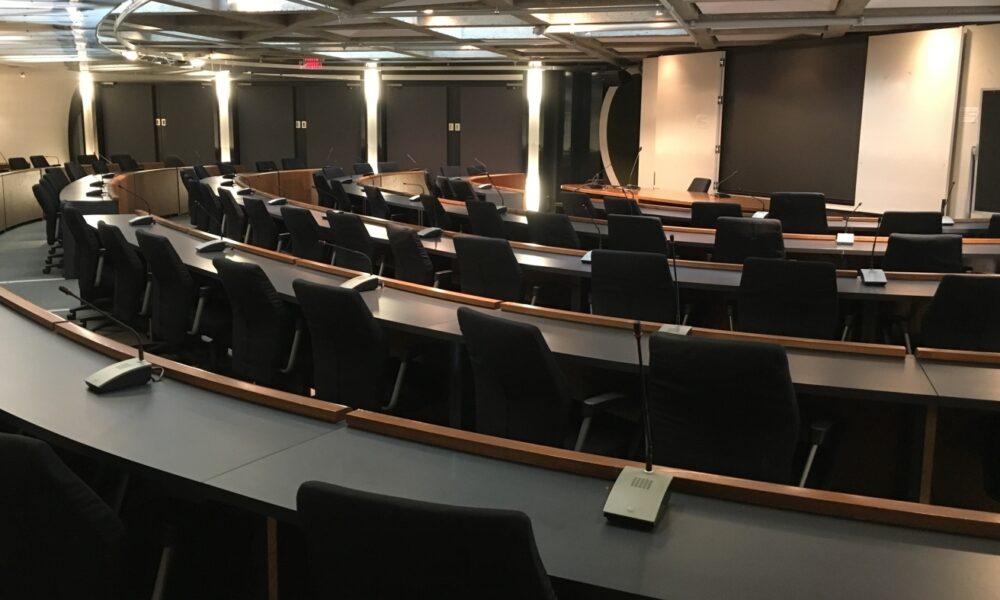During the university’s second Senate meeting of the academic year on Oct. 19, senators discussed the Kanien’kehá:ka Kahnistensera’s (Mohawk Mothers) legal dispute with McGill over the New Vic Project and the university’s COVID-19 protocols. The meeting began with memorial tributes for professors who had passed away this year, followed by opening remarks from interim principal and vice-chancellor Christopher Manfredi.
After Manfredi’s opening remarks, those gathered launched into a discussion session about McGill’s controversial archeological work on the New Vic site.
Senator David Vaillancourt questioned why McGill’s archeological approach deviates from the Canadian Archeological Association’s (CAA) framework for investigating sites of potential unmarked graves, a concern the Kahnistensera have also raised. Deputy Provost (Student Life and Learning) Fabrice Labeau responded, justifying the archeological approach by claiming that the area under investigation may have Indigenous artifacts from pre-colonial times, but almost certainly does not have unmarked graves.
“We are really looking at a place that is in front of the Hersey Pavilion, that is very far away from the Allen Memorial Hospital,” Labeau said. “The likelihood of unmarked graves in that area is very, very low [….] We also want to mention that the way the archeological search will be carried out later in other areas is not predetermined.”
Dicki Chhoyang, McGill’s Director of Stakeholder Relations, stressed that Quebec, not McGill, is responsible for the site and that McGill’s efforts to investigate the Mohawk Mothers’ claims are simply out of care for the Indigenous community.(The Mothers have repeatedly stated that their treatment from McGill has been hostile.)
“We spoke to the elected council of Kahnawake, communicated with Kanesatake, Akwesasne, Hurons-Wendat, Anishinabeg, the Assembly of First Nations,” Chhoyang said. “Then we reached out to all the elders, we explained to them, ‘we’re not officially responsible, but our community is very concerned, so in due diligence as a responsibility to them, we are reaching out to you. How would you like us to handle this?’”
Senator Margaret Levey countered Labeau and Chhoyang by pointing out the benefits for the university of complying with the CAA’s guidelines and collaborating with the Kahnistensera.
“Isn’t the advantage clear that it would be good publicity, that it would be a good step toward reconciliation?” Levey said.
Senators then briefly discussed COVID-19 policies. Senator Miranda Hickman expressed a desire for greater information and guidance from the university surrounding the pandemic, particularly in light of the dissolution of the Ad Hoc Advisory Committee on COVID Academic Planning and Policies.
“It is often hard to keep tabs on what’s happening around COVID-related issues […] and especially hard to tune into collective wisdom and best practices, as we all have to make ad hoc decisions in response to what is happening,” Hickman said.
Associate Provost (Equity and Academic Policies) Angela Campbell responded that the committee on COVID-19-related issues was always meant to be temporary and that no revival of the committee is being considered at this time.
Campbell later presented the new Regulations on Academic Staff Grievances and Disciplinary Procedures, which she had outlined at the Sept. 21 Senate meeting. The Senate approved these regulations.
Moment of the meeting:
During his opening remarks, Manfredi affirmed the University’s commitment to working with the re-elected Coalition Avenir Québec (CAQ) government, and specifically the Minister of Education, to advance joint goals.
Soundbite:
“McGill here has an opportunity to model a form of collaboration and peacemaking in the process of developing the New Vic [….] It seems collaborating with the Mothers would be far less expensive, time-consuming than a court case, and it’s difficult to understand why McGill is so certain that no remains will be found, why they would not choose to hear the Mothers.”
— Senator Ipek Türeli, Faculty of Engineering, on the New Vic project









